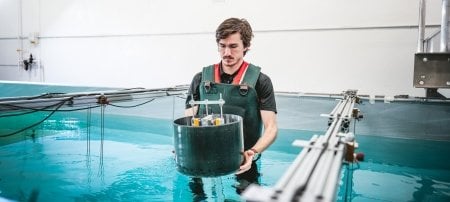For the past 17 years Andrew Storer has been a part of the faculty of the School of Forest Resources and Environmental Science (SFRES) at Michigan Technological University. On July 1, he will lead it.
Michigan Tech Provost and Senior Vice President for Academic Affairs Jacqueline Huntoon announced that Storer, the associate dean of SFRES since 2012, will succeed Dean Terry Sharik, who will retire at the end of June.
Calling it “an exciting opportunity at a very exciting time for the University,” Storer says he is “looking forward to working with faculty, staff and students to explore areas where the School and University can continue to contribute to creating the future in a changing world.” He says his years as associate dean have prepared him to help facilitate growth in the School and its programs.
Huntoon says Storer’s experience makes him well prepared to take on the leadership of SFRES: “He has been involved in accreditation activities, hosting the School’s external advisory board, reviewing and improving undergraduate and graduate curricula, mentoring faculty and students and managing financial commitments.” At the same time, according to Huntoon, Storer has been able to “maintain a strong research program that brings him, the School and the University national and international recognition.”

More than forestry
Storer received the University’s Research Award in 2012 and sees research as one of the biggest challenges facing SFRES. “There is an environment where there are more people competing for fewer resources,” he says. “SFRES has been a leader in research areas such as forestry, ecology, wildlife biology and genetics."
"We will develop strategies to ensure we remain at the forefront of research and build on our strong reputation."
Storer earned his bachelor’s, master’s and PhD degrees from University of Oxford in England. An entomologist by training, Storer sees SFRES as much more than forestry. “The School has developed distinctive education and research programs in areas such as ecology, wildlife management, climate change, conservation biology, molecular genetics and geospatial sciences.”
Leading by collaborating
Storer views interdisciplinary cooperation as the key to success and sees multiple areas of collaboration between engineered and natural systems. “This can include managing natural resources to provide various materials from them and understanding the benefits of natural systems on human health and wellbeing,” he says.
Storer joined the Michigan Tech faculty in 2001 and rose to the rank of professor of forest insect ecology. In addition, he has served as director of the Honors Institute at Michigan Tech and director of graduate studies within the School of Forest Resources and Environmental Science. His areas of expertise include forest insect ecology, impacts of exotic species on forest ecosystems, interactions among fire, insects and disease in forests and urban forest health.
Michigan Technological University is an R1 public research university founded in 1885 in Houghton, and is home to nearly 7,500 students from more than 60 countries around the world. Consistently ranked among the best universities in the country for return on investment, Michigan's flagship technological university offers more than 185 undergraduate and graduate degree programs in science and technology, engineering, computing, forestry, business, health professions, humanities, mathematics, social sciences, and the arts. The rural campus is situated just miles from Lake Superior in Michigan's Upper Peninsula, offering year-round opportunities for outdoor adventure.






Comments